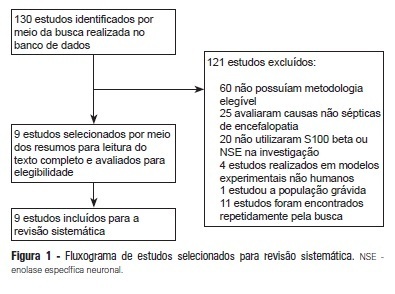
OBJECTIVE: The aim of this study was to systematically review the importance of neuron-specific enolase and S100 beta for diagnosing and monitoring septic encephalopathy. METHODS: A PubMed database search was performed to identify studies that evaluated S100 beta and neuron-specific enolase serum levels in patients with sepsis and that were published between January 2000 and April 2012. Only human studies that employed an additional method of neurological assessment were selected. RESULTS: Nine studies were identified, seven of which associated high concentrations of S100 beta and neuron-specific enolase with the development of septic encephalopathy. Four studies also associated these concentrations with increased mortality. However, two studies did not find such an association when they evaluated S100 beta levels, and one of these studies did not observe a correlation between neuron-specific enolase and septic encephalopathy. CONCLUSION: S100 beta and neuron-specific enolase are promising biomarkers for diagnosing and monitoring patients with septic encephalopathy, but more research is necessary.
Search
Search in:


Comments